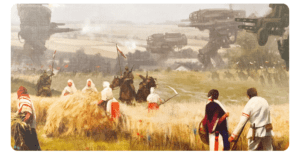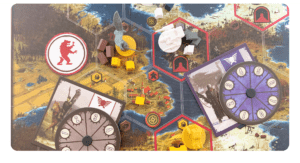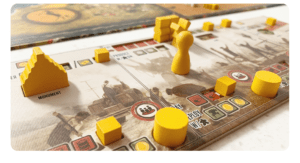Scythe is one of the first hobby board games that we picked up and it was quite the avalanche after that. There are many things that we love about this game and it has unlocked not only a love of Stonemaier Games but also a love of games that include rich themes and deep decisions. These decisions sit on top of a wonderful foundation of an easy-to-read and cohesive rulebook, beautiful artwork, and even thoughtful box design. It is easy to say that Scythe was an inspiration for us as we began to design Alynthia. But why do we love this game so much? Let’s talk about it!
Theme
Scythe has a unique theme steeped in a familiar setting. People have seen and interacting with these settings in video games, books, and movies. This connection creates a bridge for new gamers to dabble in some more medium-weight strategy games. What Scythe adds to this discourse is the combination of two seemingly opposite backdrops: 20th century farming and steampunk machinery. And it combines them in such an elegant way.

Secondary Mechanic: Battle
We want to glance over some of the core mechanics of Scythe, the area control and resource management, and head straight into an interesting secondary mechanic: battle. In this game, battle is a looming presence that stands there threatening your every decision. Which of your workers will hold your resources? Where will you establish your building? How many civilians will accompany your mech into new territory? All of these decisions and more are affected by this ever-present battle mechanic. A game of Scythe can happen without even one battle and the next game can be nothing but battle. This creates a fog over the gameplay that develops an apprehensive environment and such a welcome tension.

Components
Stonemaier rarely holds back when it comes to component quality, and although Scythe boasts a hefty price tag, it comes with some great pieces. The wooden bits and double-layered boards really elevate the overall playing experience. We love the thought and details that were put into the game, like the battle dials and the resource containers for easy storage. Small things like these will easily make a game much more appealing.

Scythe was the door into a whole new category of gaming for us. Not only are Stonemaier Games now a staple on our shelves, but unique games that challenge us to think differently are often favored. From there, games like Viticulture, Wingspan, and Gugong have now captured our attention and we are excited to continue to discover more! What is your favorite aspect of Scythe?
